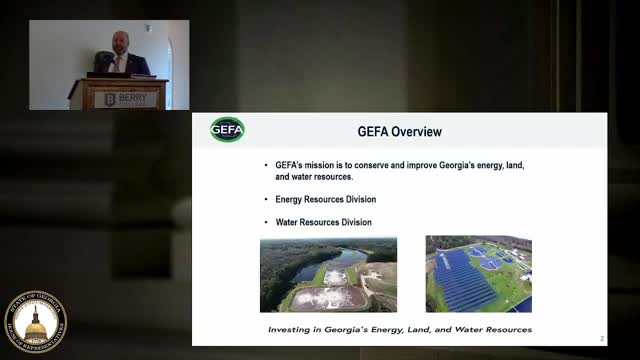Georgia Secures Billions for Energy and Water Infrastructure Upgrades
August 30, 2024 | HOUSE OF REPRESENTATIVES, Committees, Legislative, Georgia
This article was created by AI summarizing key points discussed. AI makes mistakes, so for full details and context, please refer to the video of the full meeting. Please report any errors so we can fix them. Report an error »

In a recent government meeting, officials from the Georgia Infrastructure Finance Authority (GIFA) outlined significant developments in energy and water resource management, emphasizing the impact of federal funding on state programs. The meeting highlighted GIFA's dual focus on energy conservation and water infrastructure, with a particular emphasis on the administration of over $1 billion in federal funds received through the Inflation Reduction Act.
Key initiatives discussed included the Home Energy Rebate program, which allocates $220 million for energy efficiency upgrades across Georgia. This program aims to assist homeowners in reducing energy costs, with a priority on disadvantaged communities. Additionally, the Energy Efficiency Community Block Grant (EECBG) program has been established, providing $2.9 million to local governments for energy efficiency projects.
The meeting also addressed the Grid Resilience Grant Program, which will distribute $8.6 million annually for five years to enhance the state's electrical grid in partnership with Georgia Power and local electric membership corporations (EMCs). This initiative aims to improve infrastructure resilience against severe weather events, particularly in disadvantaged areas.
On the water management front, GIFA officials discussed the Clean Water State Revolving Fund and the Drinking Water State Revolving Fund, which provide loans to municipalities for upgrading water and sewer systems. New federal programs targeting lead service line replacement and emerging contaminants were also introduced, reflecting a growing concern over water quality issues.
Officials noted the increasing demand for infrastructure funding, exacerbated by rising costs due to inflation. As a result, GIFA is implementing stricter lending criteria to prioritize funding for smaller, disadvantaged communities over larger urban areas. This shift aims to ensure that resources are allocated effectively to those most in need.
Overall, the meeting underscored the critical role of federal funding in supporting Georgia's energy and water infrastructure initiatives, while also addressing the challenges posed by rising costs and the need for equitable resource distribution.
Key initiatives discussed included the Home Energy Rebate program, which allocates $220 million for energy efficiency upgrades across Georgia. This program aims to assist homeowners in reducing energy costs, with a priority on disadvantaged communities. Additionally, the Energy Efficiency Community Block Grant (EECBG) program has been established, providing $2.9 million to local governments for energy efficiency projects.
The meeting also addressed the Grid Resilience Grant Program, which will distribute $8.6 million annually for five years to enhance the state's electrical grid in partnership with Georgia Power and local electric membership corporations (EMCs). This initiative aims to improve infrastructure resilience against severe weather events, particularly in disadvantaged areas.
On the water management front, GIFA officials discussed the Clean Water State Revolving Fund and the Drinking Water State Revolving Fund, which provide loans to municipalities for upgrading water and sewer systems. New federal programs targeting lead service line replacement and emerging contaminants were also introduced, reflecting a growing concern over water quality issues.
Officials noted the increasing demand for infrastructure funding, exacerbated by rising costs due to inflation. As a result, GIFA is implementing stricter lending criteria to prioritize funding for smaller, disadvantaged communities over larger urban areas. This shift aims to ensure that resources are allocated effectively to those most in need.
Overall, the meeting underscored the critical role of federal funding in supporting Georgia's energy and water infrastructure initiatives, while also addressing the challenges posed by rising costs and the need for equitable resource distribution.
View full meeting
This article is based on a recent meeting—watch the full video and explore the complete transcript for deeper insights into the discussion.
View full meeting
